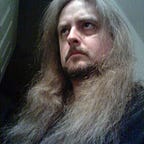When Fantasy Worlds Collide
Building foundations upon the ashes of loss.
The premise of my fantasy RPG setting is the coming of Humanity to the shores of a new land inhabited by Fae. The Humans loosely represent the European Colonists that arrived upon the shores of North America. The Fae recall the native populations that eventually suffered massive injustice and loss. Being a fantasy setting, with magic and meddlesome deities, things turned out differently when Humans and Fae clashed.
My Humans came from far away and sought to settle upon an unknown shore. The land they chose for colonization was essentially a Faerie realm — at least, the region where Humanity landed had those qualities. Humans found themselves in a very alien environment, where almost everything seemed hostile or unfathomable. The trees moved. Animals spoke. Landmarks shifted. Potable water would hide itself away. Winds caused mischief and destruction. Faeries were everywhere.
There was war. As expected. And, with the power of Human wizards, it was a war that took a toll on Human, Fae, and the land itself. The elementals had risen against Humanity, and Humanity responded with spells of binding and destruction. Though vastly outnumbered, and out of their element, Humanity had the advantage of organization and powerful arcane magic. The Fae were fickle and inclined to skirmish among themselves. They had never fought a war. Their elemental allies were beings of primal instinct, ill-suited to battlefield tactics.
These conflicts shaped the history of my setting. Created events that occurred long before the first player character adventurer was born. Set up the conditions that formed the foundation of my current campaign world. A world where Humanity is not at the top of the food chain. You see, Humans lost the war. They came very close to extinction. Those that survived were given an area of land upon which to establish a civilization. They were forbidden to expand beyond established borders. They were forbidden to practice elemental binding magic.
With those events, the tone and structure of my setting was fixed. Some fantasy tropes remained, but many were subverted — or tossed out entirely. Humanity didn’t rule over vast kingdoms or sprawling empires. They didn’t run roughshod over the other races. They couldn’t entirely depend upon their magicians or spellcraft. Also, most of the map remained vague. The realms of Man were surrounded by trackless wilderness. There could be anything beyond the looming tree line. The threats, and opportunities, were almost limitless.
One of my goals was to establish Humankind as an alien race. The other standard fantasy races would be Fae-based, or have elemental origins. Humans couldn’t breed with anyone else. No half-elves or half-orcs. Further isolation. More alienation. The idea was to present a fantasy world to my players. Not a fantastical version of Earth. Not a world long-settled after the epic clashes or catastrophes of olden times. There was no Dark Lord to provide a monolithic evil to oppose. The Fae were not, generally, evil. Neither were the elementals. They had been defending their land from invaders. Not that the Human invaders had been evil themselves. Mistakes were made. Atrocities committed in the name of survival. Humans, for the most part, simply could not understand their Fae and elemental foes.
And that is a core element of my setting.
I want the Fae to be magical and mysterious. I want the elementals to be an integral part of the setting itself, not merely a tool of Human spellcasters. The players that venture into my setting will be faced with hard choices and moral dilemmas. In many cases, the future and fate of Humanity could be decided by the actions of these heroes. Actions with consequences. Human civilization is less than 500 years old in this setting. It really is “The New World.” There are no semi-mythical events of long-past ages to inform the actions of those struggling today. Humanity stands, or falls, together. The heroes can never get too comfortable, or complacent. They can focus on the here and now.
I like that ‘passive edge’. That quiet urgency lying always at the edge of awareness. The knowledge that it could all come to an end. The ashes of past conflict and loss are still warm. Occasional embers that smolder beneath the surface have been known to flare into unexpected life (strife?). I want to give players their choice of adventure — as well as a measure of influence over their destiny. And, perhaps the destinies of entire civilizations. Here’s hoping for the ashes to produce a phoenix instead of a funeral pyre.
